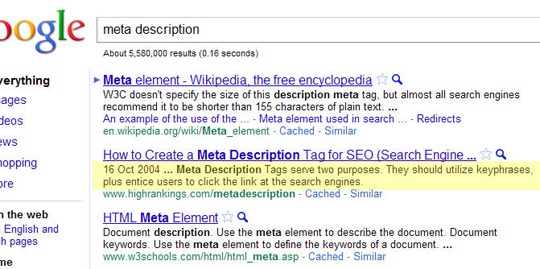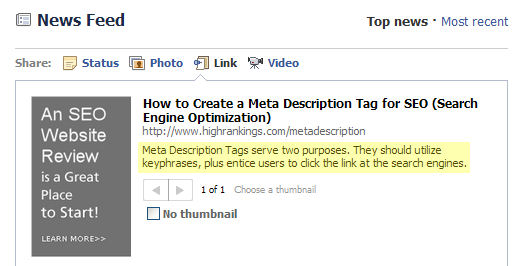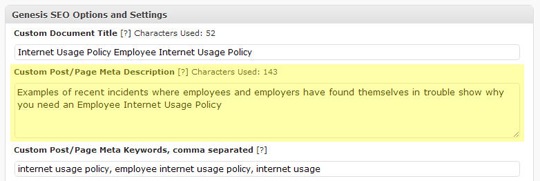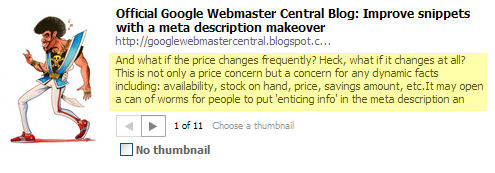Most of us know that while the search engines no longer consider the meta description in their ranking factors, this element of your page is still important in getting traffic to your site.
How Meta Descriptions are used on Search Engines and Social Media Websites
1. While not a ranking factor, the meta description is still important in organic searches as the search engines use this in the ‘snippet’ that appears below the title in search results. The more relevant and enticing this snippet is, the more likely you are to get users to click on the listing.

Google Search Results showing Meta Description used as snippet for HighRankings.com
2. Many social media sites include the meta description when you share a link. As with organic search listings, a relevant and enticing description here is more likely to get clicked on and shared on further. (See this post on using titles for social media success for more information on how links are posted on social media sites.)

HighRankings’com page posted on Facebook showing Meta Description.
So to have relevant, enticing descriptions across platforms for all of the pages on your website, it is best if you can insert a unique meta description for each individual page, but sometimes this is not feasible.
How Content Management Systems deal with Meta Descriptions
These days, most Content Management Systems provide a field for meta description for each page (or you can use a plugin/add-in that creates this feature). After many years of coding by hand to have complete control I’ve selected to use WordPress with Genesis Theme Framework [http://www.studiopress.com/] which allows you to create unique Titles, Descriptions, etc. for each page – as well as for categories and tags.

Genesis Premium WP Theme Framework SEO Options and Settings
I train my clients in how to best use these fields, but very often I find that they do not enter anything in these fields. If you don’t enter anything in the Meta Description field then there is none, there’s no default or automated description using this theme framework.
What if a page has no Meta Description?
While if you don’t enter a Custom Document Title the system makes the post/page title the <title>, the team at Studio Press, developers of the Genesis WordPress Theme Framework, have decided not to generate a default description based on input from SEOs like Joost de Valk who feel that if you are not going to handcraft a good description for a page yourself, you are better off letting the search engines generate the snippet for you, “…most plugins pick the first sentence, which might be an introductory sentence which has hardly anything to do with the subject, or another sentence with a keyword in it, which might be completely wrong to pick as description”.
SEOmoz states that in some cases you should deliberately choose to leave out the meta description, “…if the page is targeting longer tail traffic (3+ keywords), for example with hundreds of articles or blog entries or even a huge product catalog, it can sometimes be wiser to let the engines themselves extract the relevant text.”
In the image at the top of page showing Google search results for “meta description” the listing for Wikipedia illustrates the benefit of letting Google create the snippet. The page covers the Meta Element in general and the snippet shows the specific text about Meta Description. A handcrafted description would probably be too general and an automated meta description may take just the first paragraph of the page: “Meta elements are the HTML or XHTML <meta … > element used to provide structured metadata about a Web page. Multiple elements are often used on the same page: the element is the same, but its attributes are different. Meta elements can be used to specify page description, keywords and any other metadata not provided through the other head elements and attributes.”
When the Search Engine Generated Snippet Doesn’t Work Well
But the search engines don’t always do a good job with the snippets. Take the Google Webmaster Blog for example:

Google search result for “importance of meta description”
Google doesn’t even take its own advice in the post, probably because it has so much confidence in its own ability to create a snippet. This post has no meta description so the search result shows a snippet that is taken from content on the page related to the search.
In this case it is a comment posted by a reader, not even from the main post where the information on the topic should be. So a handcrafted description would probably represent the page better, but even if the first paragraph of the post was used as a default it would have made a good meta description:
 The first paragraph of the Google Webmaster Post
The first paragraph of the Google Webmaster Post
With no meta description, the description of the page when shared on other sites is less than helpful. In sharing the link on Facebook it is again using a comment which is not that helpful.

The result when sharing the post on Facebook, showing a poor description as there was no Meta Description.
I do agree that automatically generated meta descriptions are not necessary as far as organic search results are concerned, but a description of some kind is important when sharing links on social media and some directory sites using a sharing tool or another automated method. Obviously a handwritten, unique meta description is the ideal and for best results we should aim to create these, but being realistic, and honest – I have to admit that I’ve caught myself leaving out the description more times than I am happy with – there will be many times when the meta description is not filled out.
I also find it annoying when I go to share a link to someone else’s site on one of my social media accounts and the description is not helpful so I either delete it or rewrite it. If you want people to share your links on a regular basis, it’s best to make it as easy as possible and for the information on the post with your link to be as relevant as possible.
For me an automatically generated meta description would work because I just think it’s good SEO copywriting, and copywriting in general, to include an opening paragraph which describes what the post is about and includes your keyphrases. I coach my clients to do the same, but many people do not write this way.
Balancing out descriptions for Organic Search Results and Social Media Sharing
So should a Content Management System include a default meta description if you do not add one, perhaps taken from the first 150 characters of a page? Traffic from organic search results is still definitely a more important source of traffic for nearly all websites, but social media marketing has become an important part of many online marketing campaign and the ability to share links from your website is an important part of this.
Are there other options for creating descriptions?
Open Graph protocol [http://ogp.me/] is another way to indicate the information to be posted on social media sites. Perhaps its use will become common place amongst developers of Content Management Systems, themes and plugins/add-ons; as these can be set to automate the description for social media sharing separate to the meta description. Or the developers may come up with new ways to handle this issue.
Until then I’ll have a big post-it on my computer, “Don’t forget the Meta Description!”, and if you’ve found another way to address this issue with Meta Descriptions, I’d love to hear all about it.





